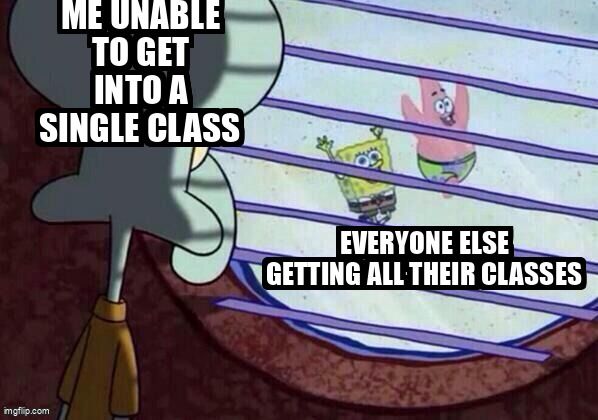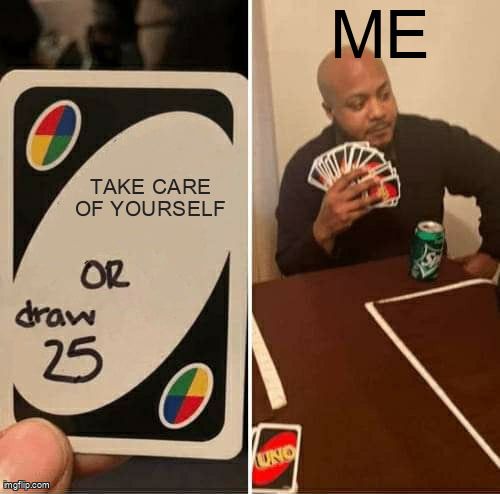
Heading to college soon?
You’ll notice a few differences from high school...
Instead of calling your teachers, Mr., Miss., or Mx., they’re now Dr., Professor, or Brian.
You have freedom now! The freedom to choose your path. The freedom to live how you want. The freedom to use your mattress as a sleigh! (True story)
But...I bet this isn't all too surprising. I remember hearing the same things too. Yet, looking back, there were things about college that no one said. So here are 5 tips that will help you get ahead!
1. Decide Whether To Take Morning Classes

Okay, hear me out! Morning classes aren't as bad as you might think. While it's tempting to sleep in and take your first class at 5pm, it may not be the best
So, why should you take morning classes?

Pros
More free time in the afternoon
Better access to college resources, professors, and advisors
Experience more college events
Easier to do clubs or sports
More class options

Cons
Have to get up early
Libraries can be busier in the evenings
Limited availability for jobs
Less time to prepare for class
Morning traffic
When I say "take morning classes", I don't mean take all your classes at 7am! As someone who is definitely not a morning person, I would always schedule my first class around 10am, since it would give me extra time to eat breakfast and do some last-minute work.

In the end, you know yourself best. If you're a productive night owl, then by all means, take your classes at night. But it doesn't hurt to throw in a few morning classes at 11am, too. Balance is key!
Tip:
Try taking harder classes in the morning and the easier ones at night; that way, you have more time and energy to go over your homework for the harder class.
Quiz
Lily wants to join the video game club’s weekly 6-8pm tournament but on those days, she has to take a difficult calculus class. Typically, she gets up late, needs prep time, and gets tired after gaming. When should she take the class?
2. Prepare For Class Registration Day

Depending on your school, registration can be a breeze or an absolute nightmare, from deciding classes to registering.
What is class registration day?
It's the day you sign up for the classes you want to take next semester.
Why is it such a big deal...?
Well, depending on the size of your school, you’re competing with hundreds to thousands of other students for a class that may only have 10 seats.
If your connection isn’t fast enough, or you click submit just .001 seconds after sign-up opens, you will find yourself staring at a screen that says "full".

What can you do to prepare?

Have a reliable internet connection!
As class registration is typically done online, decide whether you'll do it on or off campus.
If you're on campus:
Avoid using the school's wifi. It will be slower than usual.
Use your school's computer. Your internet speed will be faster.
Get up very early to find a computer. They can be extremely hard to find.
Be wary of using a hotspot. Service may not be the best that day.
Avoid using your phone or tablet. The registration site may not work well on other devices.
If you're off campus:
Check your internet connection. If it's poor, find something else.
Watch out for time zones. 7am in California isn't the same as 7am in New York.
Avoid using your phone or tablet. The registration site may not work well on other devices.
Use your wifi/hotspot. You're not on campus so you'll have fewer issues connecting.
When it comes to registering, your best bet is to do it off campus. But if you're stuck on campus, be prepared to do whatever it takes.
One year, me and my friends pulled an "all nighter" (basically, we didn't sleep at all) in the computer lab just so we can have a computer. But, as I got older and wiser, I found that as long as I got up an hour early before registration (so 6am), I can usually find a spot...which is way better than doing an all nighter!

Have backup classes!!!
Before registration day have backups for all your favorite classes!
Even if you have the most reliable, 7G, fastest internet in the world — that one class ends up being full. Now you're rushing, trying to find another option. But, you got stuck taking "The History of Feet 101".
 Photo by Tusik Only on Unsplash
Photo by Tusik Only on UnsplashHow can you avoid this heartbreaking scenario?
Make a list of 1-2 backup classes per class.
Check if their schedule works with your preferred classes.
Don't make a popular or small class your backup (they can get full too).
Save the list on the registration portal (if possible).
Submit your backup immediately once your preferred class is full.

Tip:
Talk to upperclass students to see how difficult class registration day is at your school. Also, keep an eye on the classes you couldn't get into — sometimes, a seat opens up!
3. Research Your Professors

In college, you’ll notice when it comes to picking classes, it typically lists which professor is teaching it. Instead of just going in blind, take the chance to look them up and see what they’re like!

Where can you find their info?
Using your school's online staff directory or academic page you can see the professor's background, publications, and interests.
For a student's perspective, try word of mouth. Talking to recent students can give you a current picture of the professor’s style.
Websites like Rate My Professoror Uloop are helpful too, as you get to read tons of past student reviews.
But beware: online reviews can easily be misleading and untrue. Watch out for reviews that are just blank, one word, or overly positive or negative. Pay attention to how recent they are, the amount of reviews, and the reviewer’s history.

While it can be a bit of work, doing the research is worth it. Luckily, I was able to dodge quite a number of bullets. Had I not taken the time to ask around, I would've been stuck taking biochemistry (an already difficult class), with the most infamous, challenging professor at my school.
 Tip:
Tip:
If you can't find anything about a professor, just take the class anyways! Some professors may be too new to have any reviews or they might be a visiting professor (meaning they may not have a dedicated page on the school's website.)
4. Worship The Syllabus

If your high school was anything like mine, you might or might not have heard about the all-mighty syllabus. But in college, that syllabus becomes your lifeline!
But what is it?
It’s a document that outlines information about the class, the professor, expectations, grading, and of course, the assignments!

And it's important because...?
Once your professor has gone over the syllabus, you’re on your own!
Your professor isn't going to remind you that you have a 10-page, double-spaced paper that must be written in Times New Roman, size 12, cited in APA format, with a minimum of 5 sources, which is due at 8am tomorrow!
(I'm not kidding, this was an actual psychology assignment I forgot about.)

How to make the most out of your syllabus:
Get a calendar and write down the due dates of every assignment and exam.
Write down your professor's office hours, location, and email.
Find out how to access your syllabus online.
Ask if something isn't clear.
Save a copy of the syllabus (sometimes grad schools or other programs may ask for copies).
Don't forget the syllabus can change at any time (but your professor will typically let you know)
 Tip:
Tip:
The more familiar you are with your professor's grading policy, the better you can defend yourself against an unfair grade.
Quiz
True or False: In Professor Joyce's syllabus, the final exam is worth 90% of the grade, and class participation is worth 10%. Richard thinks he can skip class and still pass if he does well on the final.
5. Look After Yourself

Okay, it’s no surprise college is a lot. Like high school, you're juggling classes, clubs, assignments, jobs, relationships, family, friends, and your mental and physical needs.
What makes it worse, is with college you have the added weight of expectations and independence, which leads to stress, doubt, and not prioritizing yourself.
How can you look after yourself?
Schedule a class-free day.
When picking your classes, try to include one day off. That extra day gives you the chance to rest, recharge, catch up, and do your favorite activities. If not, limit how many classes you take a day.
Explore the college counseling center.
This is great if you need someone to talk to or just resources. Typically, the services are free and can be used as needed. Anything you say is confidential, and won't be shared to your professors or family.
Ask for extensions.
If you're getting stressed out with classwork, don’t be afraid to ask your professor for more time. Trust me, they're very understanding, especially a certain psychology professor. If you're really struggling, reach out to your dean for help.
Drop a class.
If one of your classes is too difficult or just torture, pull out! If you drop it early then it doesn’t show on your transcript or GPA. Dropping it later will still show up, but your GPA isn’t affected. Your grade is mark as a W (withdrawl) which is better than an F.
Be active.
Moving is good for both your body and mind! Use your school's onsite gym (especially if it's free). If the gym is not for you, then walk around campus instead. As long as you're active, you'll feel good and avoid the "freshmen 15" (when you gain 15 pounds during your freshmen year).
Use coping skills.
Your head is heavy, and your arms are sweaty — you know the drill, you're overwhelmed. So what do you do? Do you listen to music, breathe, or do nothing? There are a variety of coping skills you can use. Try to figure out what works best for you!

If you're struggling, please don't be stubborn like I was! Ask for help.
In college, I felt that I could handle it all, just like in high school. But in reality, I couldn't. Even when I would vent to friends, it wasn't enough. One of the best things I did was finally putting myself first and getting the help I needed.
While I was lucky, I do know several people who weren't. They would do a lot of drinking, smoking, and drugs to deal with their problems. Before going down this path at least try something else first!
 Tip:
Tip:
Recognizing when things are starting to go downhill is valuable. Being active and finding ways to cope is crucial!
Quiz
Ever since college started, Dior sees himself as a failure. Back in high school he was use to getting straight A’s but now he’s getting a D in Bio 161. Thinking about this makes him shake and feel sick. How could Dior cope? Select all that apply:
Take Action

Your feedback matters to us.
This Byte helped me better understand the topic.


